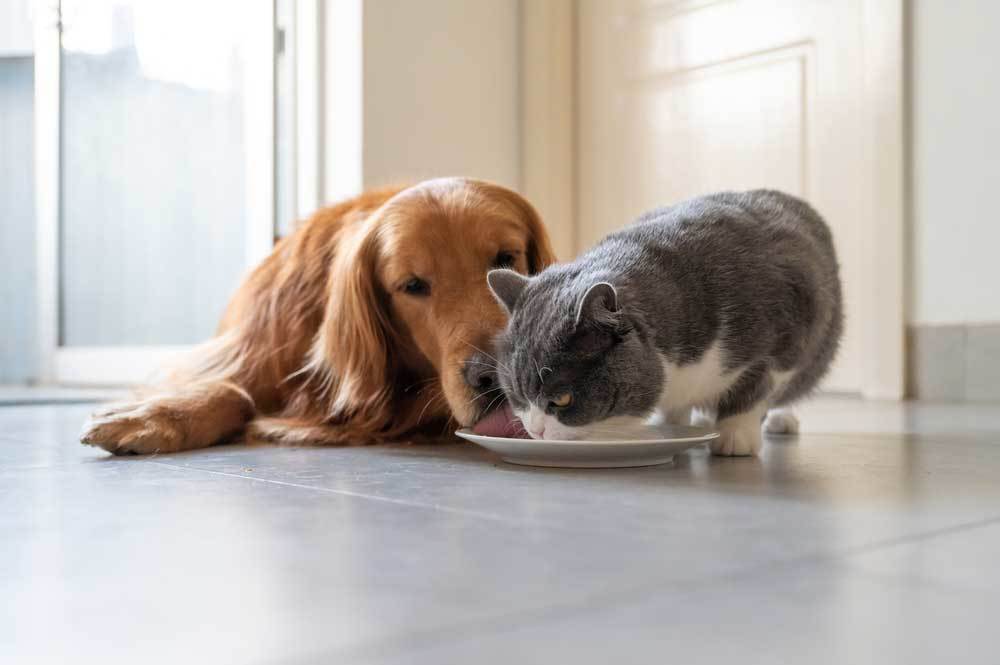Dogs are highly energetic animals. They love to run around and play and could even do it all day long. But, it’s not only the physical exercises that a dog requires. Did you know you can tire your dog out doing activities for mental stimulation?
Connect with a verified veterinarian in minutes. Licensed vets are available 24/7 to answer your questions. No need to worry about your furry family member.
Vets believe that dogs need mental stimulation as much as they require physical exercise. A balance of both will ensure that your dog lives a healthy life.
If you have brought a new puppy to your home and are wondering, ‘how do I mentally stimulate my 8-week-old puppy?’ Here are a few suggestions for you. First, let’s learn how vital mental stimulation is for puppies.
Why Is Mental Stimulation For Puppies Important?
Puppies can quickly get bored, which can result in them showing aggressive behavior. Therefore, puppies need mental stimulation and physical activity to keep them busy.
Without proper mental stimulation, a puppy could show the following signs.
- Your puppy will start barking, digging, or chewing, excessively.
- Your puppy will display symptoms of anxiety, such as chewing, licking, or panting.
- Your puppy will become hyperactive and exhibit high energy, which makes them unable to pay attention or show impulsive behavior.
A puppy with adequate mental stimulation will live a better, happier, and more comfortable life. You will also see its positive behavior and feel better about your puppy. It is why mental stimulation is so crucial for puppies.
How Do I Mentally Stimulate My 8-Week-Old Puppy?
So, you have an eight-week-old puppy and want to know how to stimulate it mentally. Well, don’t worry, as you can do plenty of things to achieve this.
Here are a few suggestions that you can try with your puppy. They will show positive changes in your puppy and keep it happier than it was before.
Have Your Puppy Work With Their Food.
It’s pretty easy to manage your dog when it comes to mealtime. It looks forward to it, so you should set its bowl and let it go at it.
That is pretty straightforward, and there is nothing wrong with it. However, you can convert it into a mentally stimulating activity.
Change up their feeding routine. Instead of simply handing over their food, try to make a fun game out of it. It will make your dog think, which can tire it out.
The best way to do this is to place your dog’s food in a toy so they have to roll it around to get the food out of it. Mind-stimulating dog toys such as the Kong Classic Toy are an excellent choice to play this game.
Ultimately, your dog will be delighted when it manages to get the food out of the toy.
Take Your Puppy For Walks So It Can Explore
Taking your dog for walks is indeed great physical exercise. However, walking your dog can also provide much-needed mental stimulation.
It allows dogs to explore their surroundings through sniffing. You might be taking the same route daily, but your dog has something new to explore each time. It will feel new and exciting smells that it feels like exploring further.
You’d be surprised to see how tired your dog seems after a walk that includes exploration rather than simply walking in a straight line.
Give Interactive Toys
Giving your puppy interactive toys to play with provides excellent mental stimulation. Interactive toys can keep your dog busy for hours and make it tired afterward.
Puzzles are excellent for keeping your dog entertained and busy. It helps your dog focus on a specific task, which can quickly tire it out.
About fifteen minutes of playing puzzle games will give your dog something to focus on and alleviate problem behaviors. These excellent toys allow your dog to use its natural problem-solving abilities.
Puzzle toys also help boost your dog’s confidence levels.
Teach The Names Of The Toys
Another excellent game to play with your dog is to teach it the names of different toys. It is called the ‘go find it’ game, and some play with treats. However, playing it regularly with treats could make your dog overweight.
Playing it with toys prevents this from happening. Start by telling your dog the name of the toy you will hide. Keep the toy on the ground and tell your dog its name. Then tell the toy’s name again and ask your dog to touch it.
Once your dog grabs the toy, praise it for doing so. After doing this a few times, you can add another toy along with the first one and play the game.
Once your dog knows the names of a few toys, hide them and ask it to find them by saying their names.
Play Nose Work Games
Dogs love to sniff and explore, so the nose work game is a good one to hone their natural skills. Your dog will find things using its nose, giving it a lot of mental stimulation in its daily routine.
To play this game, you can cut a carrot into small pieces and hide them throughout the house. For the first time, it is recommended to use something smelly because it could take a few tries for your dog to get the hang of the game.
Praise your dog when it finds the hidden item. Once your dog gets the hang of this game, you can move on to hiding treats. You can also make this game more challenging by hiding them in harder-to-find places.
Teach New Tricks
Teaching your dog new tricks is also another good way to provide mental stimulation. You can teach your dog new tricks beyond the usual commands that it already knows.
Teaching new tricks is especially helpful for naturally fearful or shy dogs. Besides being great for mental stimulation, it also helps boost confidence in your dog. It will also strengthen the bond between you and your dog.
Another great benefit of teaching your dog new tricks is that it can help increase your dog’s focus and impulse control.
Play Free Shaping Games
Playing shaping games also provides mental stimulation for dogs. The basic principle of this game is to encourage it to try new things.
In shaping games, you give your dog a chance to make its own decisions. Therefore, it increases its mental and physical flexibility.
To play this game, start by placing a box on the ground. Without any cues, let your dog investigate and decide what to do.
Playing shaping games with a box is just one way of doing it. You can play this game with your dog in many other ways.
Your dog may investigate the box by toppling it the other way or by going inside it. You can sit back and observe what your dog does with the box.
Play The Shell Game
The shell game is another popular mind game to play with your dog. The game involves hiding a treat under three identical containers. After that, you must shuffle them around, letting your dog choose the correct container containing the treat.
When playing this game, first let your dog watch as you hide a treat under one of the containers. Then, shuffle the containers around and encourage your dog to find the treat.
This game helps your dog work with its problem-solving skills.
Make An Obstacle Course For Your Puppy
Teaching your dog how to go through an obstacle course provides excellent mental stimulation. It needs to use its brain and think of a way to go through them, which is an excellent mental exercise.
If you don’t have any agility jumps or poles, you can make your own to play this game with your dog. You can even use alternative things that you can find at home.
You can use a broomstick, toys, a blanket, and some orange hazard cones to play this game with your puppy.
Teach your dog to ‘go to the blanket’, ‘jump through the broomstick’, or ‘weave through the cones’. You are asking your dog to do not just one thing but several things, one after the other, which is a big mental workout.
Engage In Interactive Play With Your Puppy
Dogs love to play with their owners, and engaging in interactive play is an excellent way to do this. It is one of the easiest ways to keep your puppy mentally stimulated. These puppies are less likely to suffer from behavioral issues.
Interactive play means that you actively engage with your dog. Some examples of interactive play to mentally stimulate your puppy are playing a game of tug of war or fetch.
Playing these games also helps strengthen the bond between you and your puppy. They provide great physical exercise and help your puppy work on its impulse control. They are also a lot of fun to do.

Review symptoms, medications & behavior to keep your pets healthy with a Vet Online in just minutes.
Ask a Vet Live NowOther Mental Stimulation Activities For Puppies
Here are some other ways to mentally stimulate your puppy.
- Prepare a puppy show with costumes.
- Bounce a ball and ask your puppy to catch it.
- Stair trotter game where you throw a ball down the stairs and ask your puppy to fetch it.
- Puppy push-ups.
- Puppy treadmill.
- Blow bubbles and watch your puppy chase them.
- Piggy in the middle game.
- The blanket race.
- Musical rugs.
Conclusion
Mental stimulation is vital for puppies. You need to ensure that your puppy engages in mental stimulation activities regularly.
You can do many mental stimulation activities with your dogs, such as playing different games or giving them various puzzle toys.
Mix a few activities to create variation and help keep your dog from getting bored doing the same activity.
Frequently Asked Questions
How Do I Keep My 8-Week Old Puppy Entertained?
Engage in short play and training sessions. Use interactive feeding tools like puzzle toys and Kongs when doing mentally stimulating activities with your puppy.
How Much Attention Does An 8-Week-Old Puppy Need?
An 8-week-old puppy requires up to least three hours of care daily, including socialization, training, and exercise.
Connect with a verified veterinarian in minutes. Licensed vets are available 24/7 to answer your questions. No need to worry about your furry family member.

Tom
Tom has always loved to write since he was little - he wanted to be either a writer or a veterinary doctor, but he ended up being a professional writer while most of his works are based on animals. He was born in San Francisco but later moved to Texas to continue his job as a writer. He graduated from the University of San Francisco where he studied biotechnology. He is happily married and a soon to be father!
Review symptoms, medications & behavior to keep your pets healthy with a Vet Online in just minutes.
Ask a Vet Live Now



